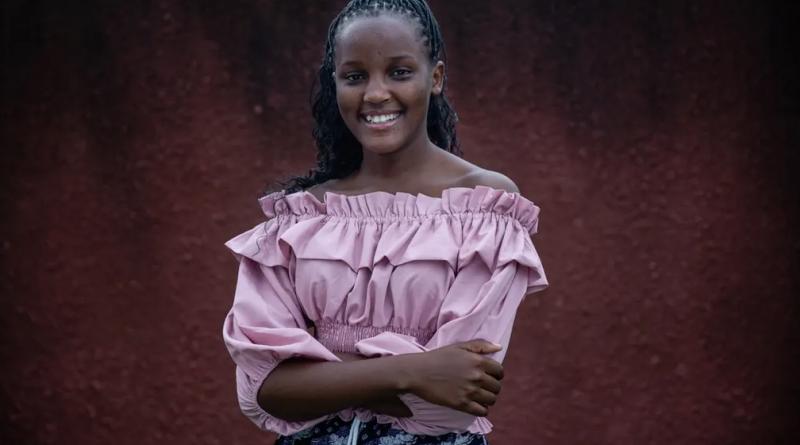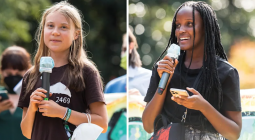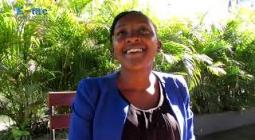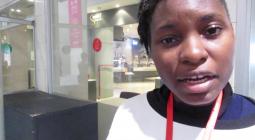‘2.4C is a death sentence’: Vanessa Nakate’s fight for the forgotten countries of the climate crisis

She started a youth strike in Uganda – then just kept going. She discusses climate justice, reparations, imperialism and why the global north must take responsibility
In February 2020, at the World Economic Forum in Davos, Vanessa Nakate had her point made for her in the most vivid and “frustrating and heartbreaking” way. The Ugandan climate crisis activist, who turned 25 last month, had gone to Switzerland to introduce some perspective to its cosy consensus. “One of the things that I wanted to emphasise was the importance of listening to activists and people from the most affected areas,” she says. “How can we have climate justice if the people who are suffering the worst impacts of the climate crisis are not being listened to, not being platformed, not being amplified and are left out of the conversation? It’s not possible.”
To this end, she appeared at a press conference with Greta Thunberg and three other white, European youth climate strikers. When the Associated Press published a photo of the meeting, it cropped out Nakate. It was, she said at the time, her first encounter with direct and blatant racism – and only reinforced her point and made her campaign more urgent. AP later expressed “regret” for its “error in judgment”.
If those discussing climate can’t even bear to acknowledge – never mind focus on – African activists, then their solutions will be incomplete and myopic. More importantly, they will only exacerbate the injustices that are already embedded in the crisis. “Africa is responsible for only 3% of global emissions,” Nakate says, speaking to me on a video call from Kampala, Uganda’s capital. “It’s important to recognise that the climate crisis was caused by the global north and it is the global south that is suffering. This creates a huge responsibility that lies with the global north to take action, to give climate justice, especially for communities on the frontlines. But this conversation is a hot tea for many people.”
“Hot tea” is a phrase she uses a few times. It conveys something between “strong medicine” and “difficult, challenging idea”. The image is typical of the way she speaks: unflinching, trenchant and persuasive.
Launching a hard conversation about climate reparations and environmental imperialism on a global stage is not where Nakate thought she was heading three years ago. At the start of 2019, she was about to graduate from Makerere University Business School, part of Uganda’s oldest university. “All my life, I knew what I was doing. I’m going to high school, then I’m going to upper high school; I’m going to university, then possibly do a master’s or professional course, get a job, get married and live happy ever after.” Her degree was in business administration and marketing and she was keen to do a postgrad in marketing. “It was all about having a greater advantage in the job market, living, being able to survive and take care of the basic necessities of life.”
It was not that she came from an apolitical family; her father, a businessman, was involved in local politics of a green, progressive bent, while her mother, who looked after her and her siblings full-time, was sympathetic to those views. But Nakate never imagined becoming part of a protest movement: “I got to know the word ‘activism’ when I started doing activism. I don’t remember it ever being in my vocabulary, or even in my imagination.”
The convention was for students to have a few months off before graduation, to do voluntary work in their communities. As Nakate started to research what challenges people were facing in their daily lives, she began “to understand what global warming means, how much impact it’s having”. They had covered climate at school, but in abstract terms of degrees of warming and to what this could be attributed; the lived experience of the crisis was new to her. Many of the active industrial and agricultural harms, “the coal and oil industries, the impact and the food we eat, all this I’ve been learning from fellow activists, from communities living on the frontline”.
As 2019 progressed, it lurched from one extreme weather event to another. In March and April, cyclones Idai and Kenneth struck south-east Africa and left 2.2 million people needing flood relief – this in Mozambique, where nearly 1 million people had already been displaced by floods. Over the summer, flooding in Niger threatened 200,000 people; in November, Djibouti recorded two years’ worth of rain in a single day. As Nakate started researching the impact of the climate crisis in her locale, she was pulled into the vortex of devastated livelihoods across the continent.
The organisations she founded – Youth for Future Africa, Rise Up and the Green Schools Project – pan in and out from the micro to the macro. She visits schools to mobilise the next generation and to help install solar panels and eco-stoves. She has just published A Bigger Picture, which is partly a memoir, but mainly a call to arms. She spoke at Cop25 and Cop26 – and alongside Ban Ki-moon, the former secretary-general of the UN, at the Forum Alpbach, which brings together major political figures and leading thinkers. And it all started on the first Sunday of 2019, with the thing she least wanted to do: a street protest.
“I was so scared to go to the streets and just hold a placard. I was scared of people looking at me, scared of what my friends from school would think. If you took to the streets, this is what many students would call a walk of shame. Who would do that?” she says. “And I wasn’t wrong about my fears. My fellow students, telling me what they thought of my activities; they were laughing, they were mocking. I was right to think it would be embarrassing.”
At the time, there was a protest movement against tuition fees, but it was considered fringe and Nakate didn’t consider herself countercultural. Student strikes face more hurdles in Uganda than they do in Europe and the US. There are bureaucratic hoops to jump through; demonstrators need permits to gather by civic buildings. While Nakate has never been arrested, some of her friends have. She was daunted by the scale of resources a movement needed just to organise a muster point with microphones.
“The other thing is education,” she says. “It is so valued in our families, in our country. Not every child is able to go to school, not every child is able to finish school, and you grow up with this feeling that education is the key to success. [Thirteen years of education are free in Uganda, the first seven of which are compulsory, but dropout rates are high.] We respect education, we understand how hard our parents have worked for it. So it is really hard for students to skip school, you know, and do a climate strike. They could be expelled.”
Boarding schools are more common (and affordable) in Uganda than in the UK, but students can go a full term without accessing the internet – and thus without knowing a youth climate movement has even started. “It’s much more difficult to build a social movement on the internet in Africa,” she says. “In Europe and the United States, students can have phones at very young ages. It’s not the same in my country. You might get a phone at 16 if you’re really lucky. More likely it would be 18.”
Initially, the protests comprised Nakate alone or with a sibling (she has two brothers and two sisters, as well as “a lot” of cousins). Over time, though, her friends stopped ridiculing her and joined in. They were older than the school strikers across Europe, in their early 20s, which was part of the reason she founded Youth For Future Africa, because “school strikes” didn’t quite describe the growing movement.
She was inspired by the Friday school strikes elsewhere in the world. Nakate says they made her feel “so scared. I had this realisation that I could not let another week pass without speaking up. But it was actually a Saturday and I realised that Friday was already gone. It gave me this feeling of urgency, this feeling that I should have started earlier. It wasn’t climate change – it was a climate crisis.”
So she started her Friday strike the next day. The movement snowballed on social media as much as on the streets, in front of petrol stations and malls, and became the muster point for various issues that were becoming more urgent, such as the degradation of the Congolian rainforests. At the end of 2019, she was one of very few youth activists invited to Cop25, which took place in Madrid.
Travelling to summits, engaging at close quarters with the speechifying of global leaders, often leaves her disillusioned – “with the feeling that things are speeding up in the wrong direction”. It is grassroots movements that restore her optimism. “I choose to believe that another world is not only necessary, but it’s also possible,” she says. “I have that hope because of the people who are organising in different parts of the world. If I ever stopped hoping, I wouldn’t have the strength to strike.”
One of the things she has been trying to add to the global agenda is loss and damage – making a proper evaluation of how much the emissions of the developed world cost the developing world, in terms of extreme weather events and the destruction of habitats and livelihoods. Rich nations periodically pledge money for decarbonisation and building renewable infrastructure, but it is often very slow to materialise.
Nakate says: “We need a separate fund for loss and damage. Because communities cannot adapt to the loss of their cultures or their traditions, they cannot adapt to the loss of lives, or to starvation. We have to start this conversation about the climate crisis; who is responsible and who has to pay?” It is important to conceive this money not as aid, but as reparations, she says. At a practical level, the money must come in the form of grants, not loans: “We don’t want to see the climate movement adding to the existing debt of the global south.”
The international community is comfortable having a conversation about adaptation finance, but shies away from the idea of reparations, the cost of which researchers are only beginning to piece together. But, says Nakate, a discussion that “won’t hear or recognise who has been harmed or affected in the past can’t recognise or respect the knowledge, wisdom and decisions of the people on the frontlines. There are so many solutions that are already on the ground in vulnerable countries. Every activist has a story to tell, and every story has a solution, and every solution has a life to change, but this change will only happen if every activist is listened to.”
At their most generative, climate summits throw up solutions that sound like the future, but actually exacerbate the problems of the present. “You hear governments talking about tree-planting campaigns – these often mean that indigenous communities are going to lose their land. This isn’t what climate justice will look like.
“If governments are talking about transitioning to electric vehicles, that cannot involve dumping all unused petrol and diesel engine vehicles in already vulnerable countries. That is not climate justice. Some of the material that is used in the manufacturing of electric vehicles means that people – women, children, girls – are exploited in the process. If the cost of having electric vehicles means exploitation of people in specific parts of the world, that is not climate justice.”
By the time Covid-delayed Cop26 happened, the carelessness of the global north towards the south – and the absurdity of trying to reach international agreements without addressing that – had a new exemplar: vaccine inequality. “Many activists from the global south have challenges getting to Cop – accreditation, funding – but now the challenge was vaccination. It made it quite impossible for activists to travel and talk about their experiences. Once you see the connection, how vaccine iniquity is hindering the centring and platforming of voices from the most affected communities, you then see the connection between vaccine distribution and climate justice.”
At the close of that conference – which had been studded with supposedly fruitful developments and last-minute pledges worthy of a soap opera – “the climate tracker showed that we were on a pathway to 2.4C”, Nakate says, soberly. “This is a death sentence for so many. It just made me realise how commitments will not stop the suffering of people in different parts of the world. Promises will not stop our planet from warming. Pledges will not stop the impact of the crisis. Only real action will bring about justice.”
A Bigger Picture by Vanessa Nakate is out now (Pan Macmillan, £20). To support the Guardian and the Observer, order your copy at guardianbookshop.com. Delivery charges may apply.
photo: ‘It’s much more difficult to build a social movement on the internet in Africa’ … Vanessa Nakate. Photograph: Esther Ruth Mbabazi/The Guardian





